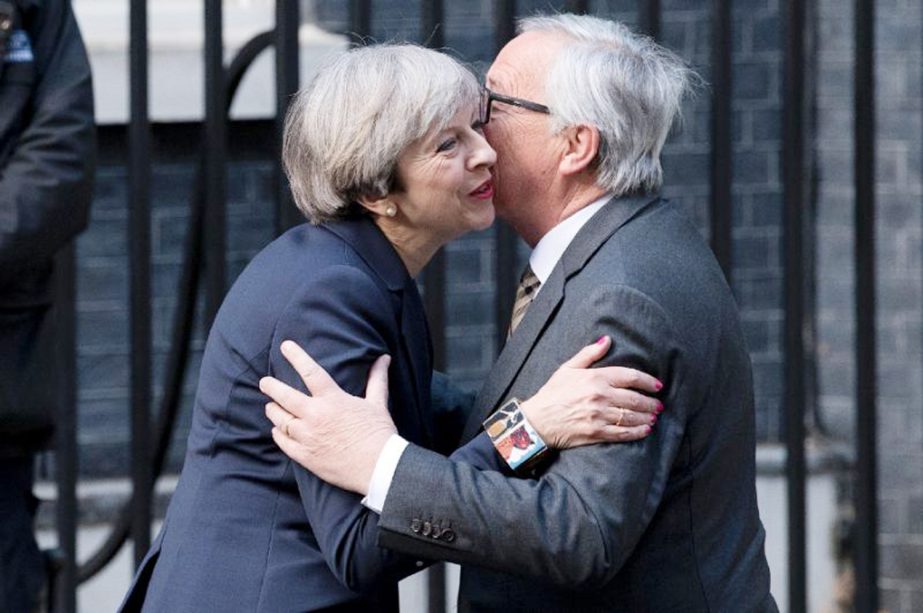
AFP, Brussels :
The EU is steeling for a possible collapse of Brexit negotiations whoever wins Britain’s increasingly close general election this week, officials and analysts say.
While many in Brussels still bet on Prime Minister Theresa May’s return to power, despite a fading poll lead, the real focus is on British threats to walk out when the talks start.
European Union Brexit negotiator Michel Barnier says he is ready to begin immediately but has warned London of the risks of walking away without agreement on Britain’s departure.
“A big punch-up or blow-up is not unlikely” after Brexit negotiations formally start, an EU source told AFP on condition of anonymity.
“A ‘no deal’ is possible-absolutely.”
May and her Brexit minister David Davis have repeatedly warned that “no deal is better than a bad deal”, particularly when it comes to a 100-billion-euro exit bill that Brussels is demanding.
London is also still insisting on having talks on a future trade deal at the same time as negotiations on the actual divorce, something Brussels won’t allow.
The EU is eyeing June 19, 11 days after Thursday’s election, for the formal start of two years of tough talks, with informal contacts “soon” after the election result.
While Brussels is officially neutral about national elections, European sources say they want a “strong leader in London” who can negotiate backed by strong support from the British electorate.
While this might seem counterintuitive in an adversarial process, the idea is that if May, for example, increases her slim majority she would be less beholden to eurosceptics in her own party.
This, the reasoning goes, would make her able to make compromises on thorny issues such as the exit bill, and on safeguarding benefits and immigration rights of EU citizens living in Britain.
But the increasingly harsh tone on Brexit and the threats to walk away which have emerged during the election campaign have worried some in Brussels.
Frenchman Barnier insisted when EU states gave him his formal mandate on May 22 that quitting talks was “not my option, my option is to succeed.”
He strongly warned that if Britain does so he would “advise everyone to explain well what the consequences are”, not least for a future EU-British trade deal.
European Commission chief Jean-Claude Juncker has delivered a similar warning about the threats. “My experience in politics always was that those who are going out have to come back,
The EU is steeling for a possible collapse of Brexit negotiations whoever wins Britain’s increasingly close general election this week, officials and analysts say.
While many in Brussels still bet on Prime Minister Theresa May’s return to power, despite a fading poll lead, the real focus is on British threats to walk out when the talks start.
European Union Brexit negotiator Michel Barnier says he is ready to begin immediately but has warned London of the risks of walking away without agreement on Britain’s departure.
“A big punch-up or blow-up is not unlikely” after Brexit negotiations formally start, an EU source told AFP on condition of anonymity.
“A ‘no deal’ is possible-absolutely.”
May and her Brexit minister David Davis have repeatedly warned that “no deal is better than a bad deal”, particularly when it comes to a 100-billion-euro exit bill that Brussels is demanding.
London is also still insisting on having talks on a future trade deal at the same time as negotiations on the actual divorce, something Brussels won’t allow.
The EU is eyeing June 19, 11 days after Thursday’s election, for the formal start of two years of tough talks, with informal contacts “soon” after the election result.
While Brussels is officially neutral about national elections, European sources say they want a “strong leader in London” who can negotiate backed by strong support from the British electorate.
While this might seem counterintuitive in an adversarial process, the idea is that if May, for example, increases her slim majority she would be less beholden to eurosceptics in her own party.
This, the reasoning goes, would make her able to make compromises on thorny issues such as the exit bill, and on safeguarding benefits and immigration rights of EU citizens living in Britain.
But the increasingly harsh tone on Brexit and the threats to walk away which have emerged during the election campaign have worried some in Brussels.
Frenchman Barnier insisted when EU states gave him his formal mandate on May 22 that quitting talks was “not my option, my option is to succeed.”
He strongly warned that if Britain does so he would “advise everyone to explain well what the consequences are”, not least for a future EU-British trade deal.
European Commission chief Jean-Claude Juncker has delivered a similar warning about the threats. “My experience in politics always was that those who are going out have to come back,

